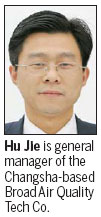I can breathe clearly now
Updated: 2013-02-08 09:10
By Wang Chao and Jiang Xueqing (China Daily)
|
|||||||||||
Some enterprising companies ARE making the best of poor air quality
Thick smog has lingered above Chinese cities for weeks, blocking sunlight and obscuring views, but some Chinese companies have seen a silver lining through the toxic cloud.
Since 2011 when the US Embassy started monitoring the air quality in Beijing, there has been increased public awareness of PM2.5 - particles smaller than 2.5 micrometers that people can easily inhale. As more people have become aware of the potential harm these particles can do to health, protection devices such as masks and air purifiers have become increasingly popular.
Hu Jie, general manager of Broad Air Quality Tech Co, a subsidiary of Broad Group, says the recent smog has transformed air purifiers from a dispensable home appliance into a daily necessity.

Broad Group is a major Chinese air conditioner and air purifying products manufacturer, whose headquarters are in Changsha, Hunan province. It also supplies air purifiers to the central government.
Last year its revenue from air-purifying products grew by 50 percent to about 1 billion yuan ($160 million; 118 million euros), the company says.
"Ever since last year when PM2.5 particles were drawn to public attention, demand has surged," Hu says. "And we expect an even better performance this year."
No independent body verifies the market volume of air purifies, but Hu reckons the market is worth around 40 billion yuan.
Most air-purifying products are used in homes, hospitals and hotels, but the market has only just taken off. Broad began related research and development in 2005, one of the earliest companies to do so.
Although they are late starters, domestic air-purifier manufacturers do not have much to learn from their foreign counterparts. The reason is embarrassing: The air quality in Western countries is much better than in China, so Chinese companies have had to develop a robust suite of products based on the domestic situation.
While most home air purifiers use paper to filter dust and toxic chemicals, Broad developed electrostatic technology to get rid of particles with a diameter smaller than 0.1 micrometers, "as paper can only filter particles with diameter larger than 10 micrometers and its easy to cause secondary pollution", Hu says.
He says the market potential is "infinite", as air pollution is a problem that is unlikely to be solved any time soon.
"It is just like air conditioners: 30 years ago, few people thought it was necessary to install an air conditioner at home, but now almost every home has one," Hu says, adding there will be more niche products in the future, such as powerful air filters for operating rooms as well as less powerful ones for daily use.
Suzhou Beiang Technology Co is another company that has been able to breathe easy despite the smog. In the last two weeks in January, when the capital was shrouded in gray, the company saw its revenues exceed 1.5 million yuan.
Last year the company, based in Suzhou, Jiangsu province, manufactured and sold about 2,000 ionic-wind air purifiers, earning 5 million yuan in the process. Half of its customers are located in Beijing, while the others are in Shanghai and the provinces of Jiangsu and Zhejiang.
Ran Hongyu, the company's founder and president, says their January sales will easily have exceeded 3 million yuan. "But our production capacity is unable to meet the huge demand, so we have had to stop taking orders," he says. "We expect revenue to reach 30 million yuan this year."
The company is supplying more equipment and manpower to its factories to increase productivity. It is also seeking to raise 30 million yuan, leading a number of venture capital firms to express an interest.
"Every year, about 5 million units of air purifiers are sold in the US at an average price of $200. About 25 percent of US families have air purifiers," Ran says. "Here in China, the number of families is much larger and the level of air pollution in cities is much higher. The Chinese market capacity for such products should be three to four times higher than in the US."
Fu Guowei, a professor at Tsinghua University's school of environment, says these companies can capitalize on the smoggy condition for a long time, as the pollution problem cannot be easily solved.
The smog occurs for various reasons, with exhaust from cars believed to be a major source. But emissions are not the only reason, Fu says, and the dry, windless climate can exacerbate the problem.
"In the foreseeable future, pollution problems will get worse as a result of the quick economic development and expansion of cities," Tsinghua's Fu says. "So these companies will still earn money in the next five to 10 years."
Nevertheless, he says, it is a temporary business that cannot and should not last for a long time, as it is based on the premise that the air quality will continue to be bad. "Sooner or later, the government will make mandatory regulations to control the emissions, and by then these companies will face a shake-up."
Contact the writers at wangchao@chinadaily.com.cn and jiangxueqing@chinadaily.com.cn
(China Daily 02/08/2013 page16)
Today's Top News
List of approved GM food clarified
ID checks for express deliveries in Guangdong
Govt to expand elderly care
University asks freshmen to sign suicide disclaimer
Tibet gears up for new climbing season
Media asked to promote Sino-Indian ties
Shots fired at Washington Navy Yard
Minimum growth rate set at 7%
Hot Topics
Lunar probe , China growth forecasts, Emission rules get tougher, China seen through 'colored lens', International board,
Editor's Picks

|

|

|

|

|

|





